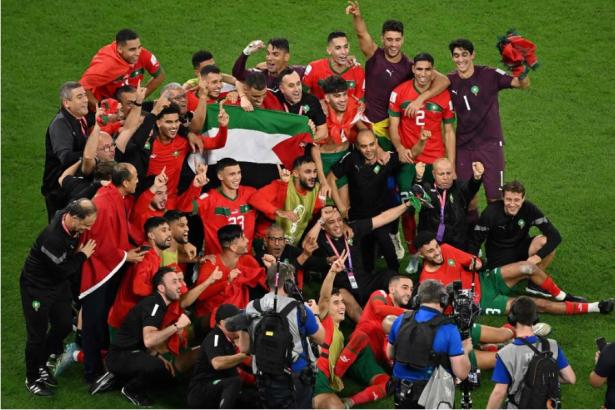When Morocco defeated Spain in a penalty shootout, advancing to the quarterfinals of the Qatar 2022 men’s World Cup, players celebrated by posing for their victory photos with a Palestinian flag. This World Cup featured memorable performances on the pitch—and powerful statements of solidarity with the Palestinian cause off it.
The Qatar World Cup has shown us that this is an issue that cannot and will not be silenced. In a time of a shocking resurgence of anti-Jewish bigotry, both online and in our politics, it is important for anyone on the left to assert and reassert that there is a galaxy of difference between anti-Semitism, which must be opposed in every instance, and resistance to the state of Israel. Judaism is a several-thousand-years-old religion and culture that has withstood efforts at physical and cultural eliminationism. The Israeli state, still just 74 years old—younger than either Joe Biden or Donald Trump—is now run by a hard-right cabal that has more in common with the new right-wing authoritarianism stalking the globe than anything resembling a democracy.
The World Cup, for all its problems, has proven to be a potent platform for raising the visibility of the Palestinian people. “Free Palestine” signs have rippled in the wind at numerous matches, as when Tunisian fans unfurled a massive banner at their country’s first-round match against Australia. Ahead of Morocco’s historic win over Belgium, their fans sang, “To our beloved Palestine, the most beautiful of all countries.” After Morocco defeated Canada, players waved the Palestinian flag on the field in celebration. In a match between Tunisia and France, a pitch invader scampered across the grass with a Palestinan flag in hand. Once security guards nabbed him, fans chanted “Palestine!” as security lugged him off the field. One fan from Egypt appeared live on television in Israel and said, “Viva Palestine.”
The Qatar World Cup has conjured a powerful moment of Arab solidarity. Fans from across the Arab world have cheered on each other’s teams while simultaneously showing support for Palestinian rights. Given the crackdown on the Palestinian liberation struggle in much of the Arab world and the pursuit of normalized relationships with Israel, these are statements of national as well as regional resistance.
Although Qatar has not formalized diplomatic relations—asserting that a Palestinian state must first be established—the Gulf country allowed direct flights from Israel for the duration of the World Cup. Unlike governments in Bahrain, Morocco, and the United Arab Emirates, Qatar did not sign on to the 2020 diplomatic agreements known as the Abraham Accords. Still, raising the issue of Palestine in many Gulf nations is a bracing act of rebellion.
Jared Kushner, who claimed credit for the agreement, attended the Qatar World Cup. Ivanka Trump posted a series of photographs on Instagram, including one with France mega-star Kylian Mbappé. One is left to wonder whether Kushner and Trump, ensconced above the masses in their rarified VVIP suite, heard the chants from below for Palestinian liberation.
Shireen Ahmed, the CBC senior contributor who traveled to Qatar to cover the World Cup, told us that she had never seen so many Palestinean flags carried by people from other countries, or so many fans supporting Palestinian liberation. “As someone who was born and raised in Canada and who has always had to navigate my own support for Palestinian resistance through a lens of whitewashing the occupation and the struggles, challenges, and cultural genocide of Palestinian people, this was really impactful,” she said. “The whole experience was transformative for me.”
In Qatar, Ahmed has witnessed the mainstreaming of Palestinian rights in everyday soccer conversations. “I don’t need other people to validate my political standpoint, but it was tremendously validating,” she told us. “There was a sense of solidarity in seeing all these flags being carried by people from almost every supporters’ group. I found that to be uplifting and encouraging, and something I really hope I see again.”
Palestine became an official member of FIFA in 1998, making the world’s governing body for soccer one of the first international organizations to offer formal recognition. And FIFA has largely looked the other way as Palestinian flags pop up across World Cup stadiums, while simultaneously cracking down on protesters trying to lift up the issue of state repression in Iran. FIFA president Gianni Infantino has consistently run interference for his Qatari hosts, whether by supporting the last-minute beer ban or threatening players with yellow cards for simply wearing a “One Love” armband in support of LGBTQ rights, thereby torpedoing the endeavor.
In a viral video from the Qatar World Cup, a rambunctious England fan appeared on television with two statements. First, in accordance with the popular English phrase, he said, “Football is coming home.” Second, he exhorted, “Free Palestine!” Turns out, whether the honchos running this tournament wanted it or not, this latter demand has become a global clarion call. It’s a reminder that, as brutal and oppressive as this World Cup has been, it can also be a pedestal for justice.
[Dave Zirin is the sports editor of The Nation and the author of The Kaepernick Effect: Taking a Knee, Changing the World.
Jules Boykoff is a professor of political science at Pacific University in Oregon and the author of four books on the Olympic Games, most recently NOlympians: Inside the Fight Against Capitalist Mega-Sports in Los Angeles, Tokyo.]
Copyright c 2022 The Nation. Reprinted with permission. May not be reprinted without permission. Distributed by PARS International Corp.
Please support progressive journalism. Get a digital subscription to The Nation for just $24.95!


Spread the word